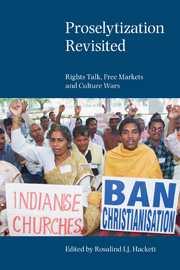Revisiting Proselytization in the Context of Rights Talk, Free Markets and Culture Wars
Summary
Contrary to the hopes and expectations of many, the neo-liberal trends of our global era have neither led to free markets for religion everywhere nor always to civility between religions in modern pluralistic states. In fact, the human rights revolution has arguably engendered new conflicts between local and foreign religious groups in a range of settings, not least Russia and India (Witte 2007). One of the most noticeable areas of contention pertains to the propagation of one's religion with the intent to convert others. From French schools to tsunami-affected areas, in Turkish streets and Indian state legislatures, accusations of aggressive or improper proselytizing activity now make global news. Legal scholar John Witte trenchantly describes the problem of proselytizing as “one of the great ironies of the democratic revolution of the modern world” (Witte 2007, 13).
The problems arising over proselytism were significant enough in the late 1990s that the Center for the Study of Law and Religion at Emory University—under the leadership of the aforementioned John Witte—embarked on a major project known as the “The Problem and Promise of Proselytism in the New Democratic World Order (1995–2000).” It was described as “an empirical and normative study of the new war for souls breaking out in various new democracies of the world between and among indigenous faiths and foreign proselytizing faiths”.
- Type
- Chapter
- Information
- Proselytization RevisitedRights Talk, Free Markets and Culture Wars, pp. 1 - 34Publisher: Acumen PublishingPrint publication year: 2008



